

7 Essential Insights on Pet Support Animal Benefits
by Lena Park
Last updated: July 6, 2025
Verified and Approved by:
Angela Morris,
MSW, LCSW
Fact Checked

Overview
The article titled “7 Essential Insights on Pet Support Animal Benefits” explores the profound advantages that emotional support animals (ESAs) offer to individuals grappling with mental health challenges. It compassionately acknowledges the struggles faced by many, highlighting how ESAs can significantly alleviate symptoms of anxiety, depression, and PTSD. Research reveals that a substantial percentage of ESA owners experience improved mental health, emphasizing the vital role these animals play in enhancing emotional well-being and providing essential support. By offering an ESA letter, individuals can find a nurturing solution to their emotional struggles, fostering a sense of connection and comfort in their journey toward healing.
Introduction
Navigating the emotional landscape of mental health can often feel overwhelming. Many individuals find themselves grappling with feelings of loneliness and despair, seeking comfort and companionship in the form of pet support animals. These cherished companions not only help to ease the burden of isolation but also play a vital role in enhancing overall well-being.
In this article, we will explore the myriad benefits of emotional support animals, including:
- Their therapeutic effects
- The legal protections they offer
- The essential steps to secure an ESA letter
Yet, with misconceptions and legal complexities surrounding this topic, how can individuals ensure they receive the support they truly need? Together, we can uncover the answers and find the comfort that comes from these remarkable bonds.
Wellness Wag: Streamlined ESA Letter Services for Pet Owners
At Wellness Wag, we understand the emotional challenges that many individuals face when dealing with mental health issues. The journey toward healing can often feel overwhelming, and that’s where a pet support animal can play a vital role in providing comfort and companionship. Our platform offers a streamlined and user-friendly way to obtain ESA letters, ensuring that you can access the support you need quickly and easily.
Beginning your ESA registration is as simple as answering a few brief questions about your unique needs. The process starts with a brief assessment to determine your eligibility, followed by compassionate consultations with licensed medical professionals who are dedicated to evaluating your individual needs. We want you to feel supported every step of the way.
Once approved, you can expect to receive your official ESA letter within 24 hours, providing timely assistance for those facing urgent mental health challenges. For states with specific regulations, we kindly ask you to allow up to 30 days as required by law. Upon placing an order, you will receive a confirmation email detailing your purchase, ensuring transparency and peace of mind during this important process.
Research indicates that 62% of ESA owners reported improved mental health during the pandemic, compared to only 19% of those without an ESA. This highlights the profound impact that the companionship of an ESA can have on one’s emotional well-being. At Wellness Wag, we are here to facilitate swift access to pet support animals, aligning with the growing trend of individuals seeking emotional support to help alleviate symptoms of anxiety, depression, and PTSD.
With over 200,000 documented ESAs in the U.S. and a significant increase in registrations, Wellness Wag is committed to meeting the rising demand for legitimate ESA letters that comply with legal requirements. We are here to support you on your journey, ensuring that you are not alone in facing your challenges.
Service Animals vs. Emotional Support Animals: Key Legal Differences
Service creatures are specifically defined under the Americans with Disabilities Act (ADA) as dogs trained to perform tasks that directly relate to an individual’s disability. This includes assisting individuals who are blind, notifying those who are deaf, or providing aid to individuals with psychiatric conditions. In contrast, pet support animals offer comfort and companionship but lack the specialized training necessary to perform specific tasks. This distinction is crucial, as service creatures enjoy broader access privileges in public areas, including restaurants, shops, and public transport, while pet support animals are primarily protected by housing regulations, allowing them to reside in no-pet accommodations under the Fair Housing Act.
Service dog owners have full public access rights as protected by the ADA. They can bring their service dogs into public spaces, such as restaurants, stores, libraries, and public transportation. Additionally, they are entitled to housing accommodations, even in areas where pets are typically restricted. It is essential to respect the working status of service dogs and avoid distracting or petting them without permission from their handlers, as this can interfere with their tasks and compromise the safety and well-being of the handler. Observing proper etiquette, like giving service dogs and their handlers space, is crucial to ensure their uninterrupted focus.
Legal expert viewpoints highlight that the rights of service beings are well-established, whereas the legal safeguards for pet support animals are frequently misinterpreted. For instance, while service creatures are allowed in public spaces, pet support animals do not possess the same access privileges and are generally confined to residential environments. This has led to confusion and misrepresentation, with some ESA owners asserting their pets are service creatures to gain access to public areas, a practice that raises both legal and ethical concerns.
Recent legal cases illustrate these differences. For example, a significant case involved a woman who attempted to enter a public park with her ESA, claiming it was a service creature. The park manager clarified that emotional support animals do not possess the same public access rights, highlighting the prevalent misunderstandings surrounding these classifications.
Disability rights advocates stress the importance of understanding these legal distinctions related to pet support animals. They contend that although emotional assistance creatures can offer considerable emotional aid, they do not hold the same legal status as service beings, which are trained to aid individuals with particular disabilities. As of 2025, the legal landscape continues to evolve, with ongoing discussions about the rights of emotional support creatures and the need for clearer regulations to protect both individuals with disabilities and the integrity of service creature classifications.
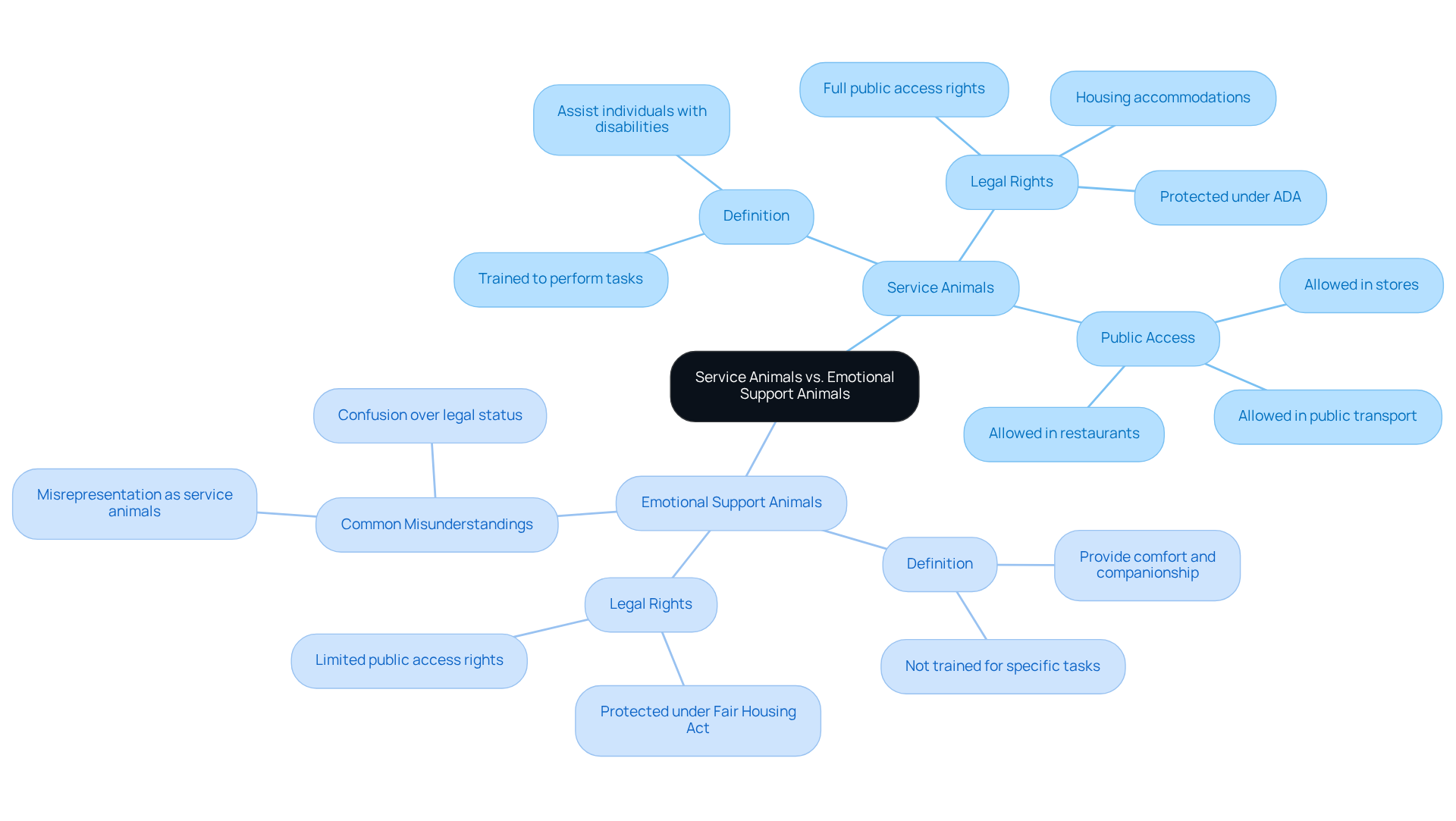
Therapeutic Benefits of Emotional Support Animals for Mental Health
Emotional support creatures play a crucial role in alleviating symptoms of anxiety, depression, and PTSD. Their presence has been linked to significant reductions in stress levels, enhanced mood, and an increased sense of purpose among individuals facing mental health challenges. Have you ever felt overwhelmed by these emotions? Research indicates that interactions with pets can stimulate the release of oxytocin and serotonin—hormones associated with feelings of happiness and relaxation. A recent study found that 88% of ESA owners reported a positive impact on their mental health, with most rating effectiveness at 8/10 or higher. This highlights the substantial benefits of these animals.
Furthermore, research has indicated that emotional support animals can lead to a decrease in PTSD symptoms. Participants have experienced significant reductions in anxiety and depression scores over time. For instance, individuals receiving animal-assisted interventions reported enhanced socialization and a decrease in general distress. This underscores the therapeutic benefits of pet companionship. The American Psychiatric Association emphasizes that the bond between humans and their pets can be a vital resource for mental health recovery, particularly in the wake of the COVID-19 pandemic. They state, “The benefits of pet ownership to many Americans seem to outweigh the stressors.”
Statistics reveal that:
- 69% of pet owners cite companionship as a key benefit.
- 66% believe their pets help relieve stress.
This highlights the significance of pet support animals in offering emotional assistance and stability. Have you considered how your pet might be providing you with comfort? Expert insights further affirm that the companionship of a pet support animal can mitigate feelings of loneliness and promote a sense of belonging, making them invaluable allies in the journey toward improved mental health. Additionally, studies suggest that cat purrs may have therapeutic effects, aiding healing and reducing stress. This further illustrates the diverse benefits of different types of ESAs.
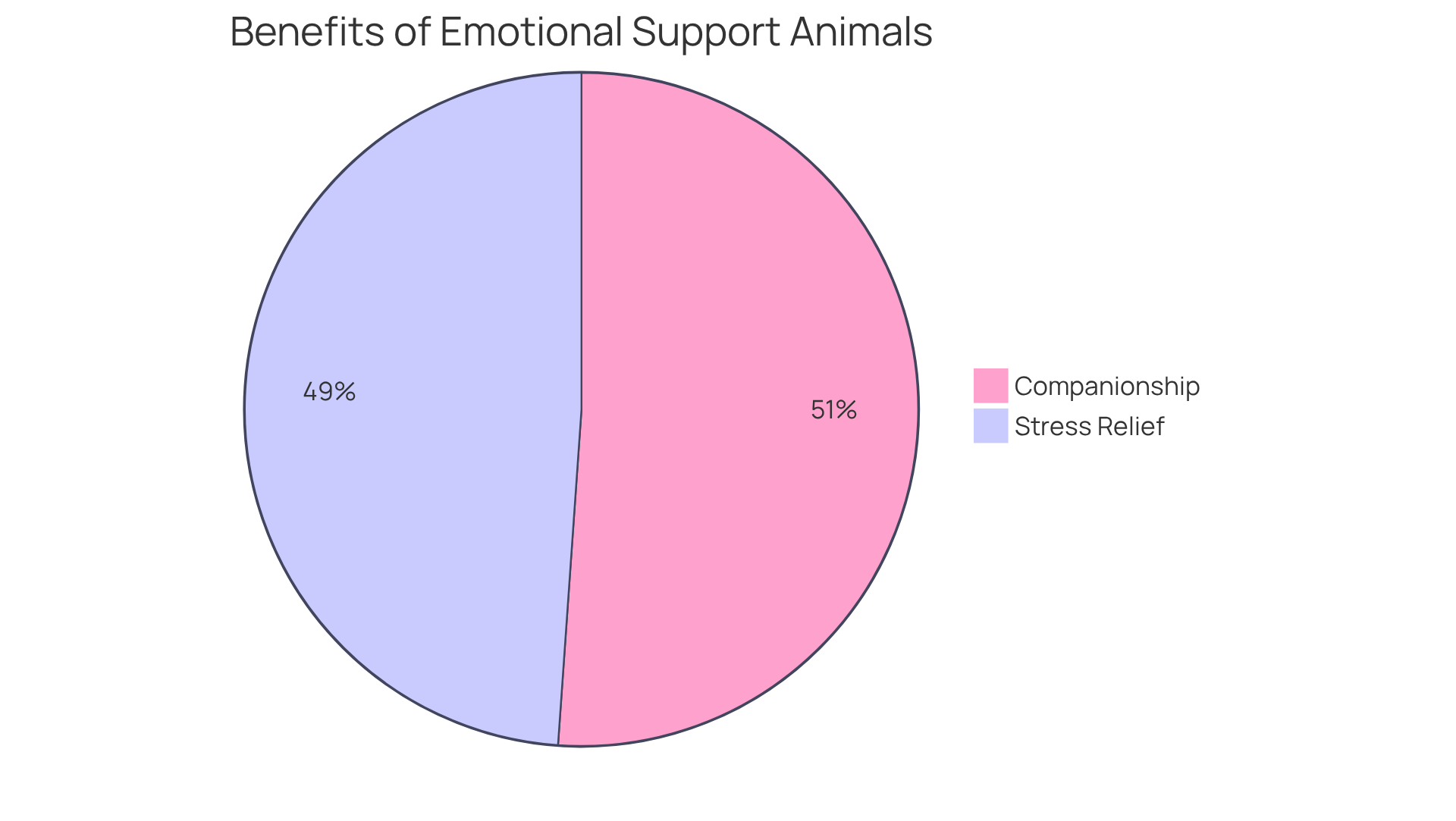
Obtaining Documentation: Steps to Secure Your ESA Letter
Navigating emotional challenges can be overwhelming, and for many, the journey to finding support is fraught with difficulties. To address these struggles, obtaining a letter for a pet support animal can be a compassionate solution that brings comfort and companionship into your life.
To begin this supportive process, individuals should follow these steps:
- Complete an online assessment tailored to your unique emotional well-being needs. This step is crucial in understanding your situation and determining eligibility.
- Arrange a consultation with a licensed mental health expert. They will perform a comprehensive assessment of your emotional needs, ensuring that your concerns are heard and validated.
Upon approval, you will receive a professionally crafted ESA letter, typically within 24 hours of your consultation. This straightforward procedure enables swift access to vital emotional assistance provided by a pet support animal, allowing you to fully enjoy your residential life.
Take the first step today by engaging with Wellness Wag. We are here to support you in obtaining your ESA letter, guiding you through this journey with empathy and care. Remember, you are not alone in this; together, we can help you find the emotional support you deserve.
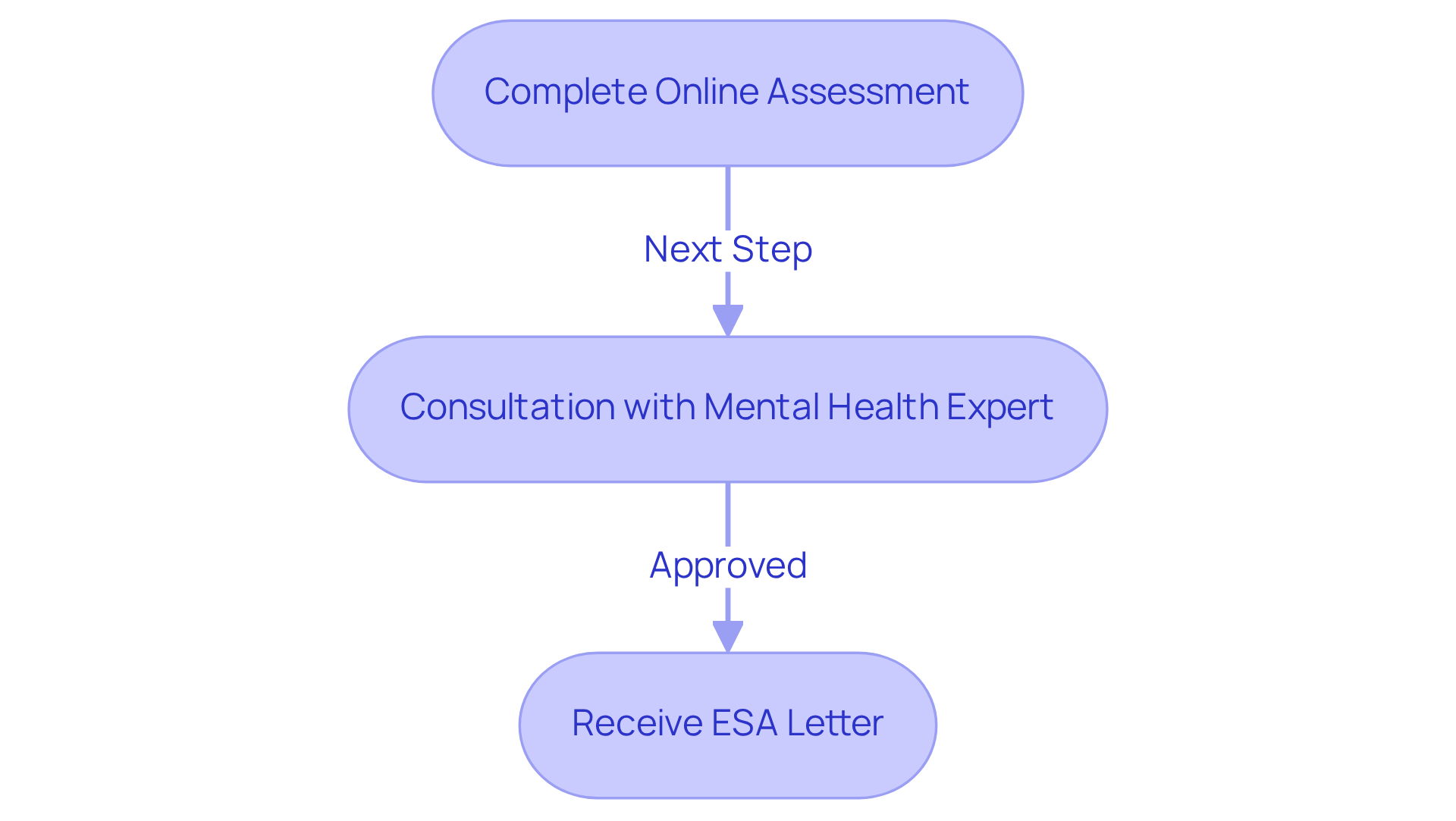
Housing Rights: Legal Protections for Pet Support Animals
Under the Fair Housing Act, individuals with valid Emotional Support Animal (ESA) letters are entitled to reasonable accommodations in housing, even in properties that enforce no-pet policies, as their ESA can be classified as a pet support animal. This legislation is designed to protect those who rely on pet support animals, preventing landlords from charging extra fees for these essential companions. It ensures that tenants can live alongside their pet support animals without facing discrimination, which is crucial for their well-being.
In 2023, disability discrimination accounted for over 52% of housing complaints, highlighting the challenges that ESA owners often face. Despite the protections in place, compliance among landlords varies significantly; approximately 60% adhere to the Fair Housing Act regarding pet support animals, yet many still impose fees or deny requests based on misconceptions about the law. This inconsistency can be disheartening for those who depend on their emotional companions.
Advocacy organizations emphasize the importance of understanding these rights, as they are vital for fostering an inclusive environment for individuals who rely on pet support animals. While service dogs are not required to be certified or registered, obtaining certification can lend credibility and ensure that the service dog has received proper training. This distinction is essential for understanding the different legal rights and access granted to service dogs compared to emotional support animals.
As awareness of pet support animal ownership and the associated legal protections continues to grow, it is crucial for tenants to be informed and prepared to assert their rights effectively. Remember, you are not alone in this journey; support is available, and there are resources to help you navigate these challenges.
Traveling with ESAs: Understanding Your Rights and Regulations
In 2025, traveling with a pet support animal has become increasingly complicated, as many airlines no longer recognize these beloved companions as service beings, which strips them of essential travel privileges. This shift can be disheartening for individuals who rely on their ESAs for emotional support. Yet, some airlines still permit pet support animals in the cabin, provided they adhere to specific requirements. Typically, airlines ask owners of pet support animals to submit valid documentation, such as an ESA letter, at least 48 hours before travel. This step is crucial for ensuring a smooth journey and aligning with airline policies.
Recent surveys reveal that around 45% of respondents feel pet support animals should be welcomed in cabin areas, signifying a growing acknowledgment of their role in mental health support. However, the number of airlines allowing pet support animals to travel in the cabin has diminished, with many imposing stricter regulations. For example, Delta and United Airlines have implemented policies requiring prior documentation and have ceased accepting certain breeds as emotional support animals.
Travel specialists emphasize the need for clarity in airline regulations regarding pet support animals. As Eva Grey insightfully observes, “As our understanding of mental health expands and becomes more inclusive, so must our regulatory frameworks.” This perspective highlights the ongoing hurdles that pet support animal owners encounter, especially when navigating the diverse airline regulations that can lead to confusion and frustration.
Case studies show that while pet support animals provide invaluable comfort as emotional assistance animals, concerns about their behavior during flights have prompted airlines to tighten their regulations. Incidents involving emotional support animals have risen, resulting in calls for more standardized regulations across the industry. As the travel landscape evolves, it is vital for ESA owners to stay informed about their rights and the specific requirements of the airlines they choose to fly with.
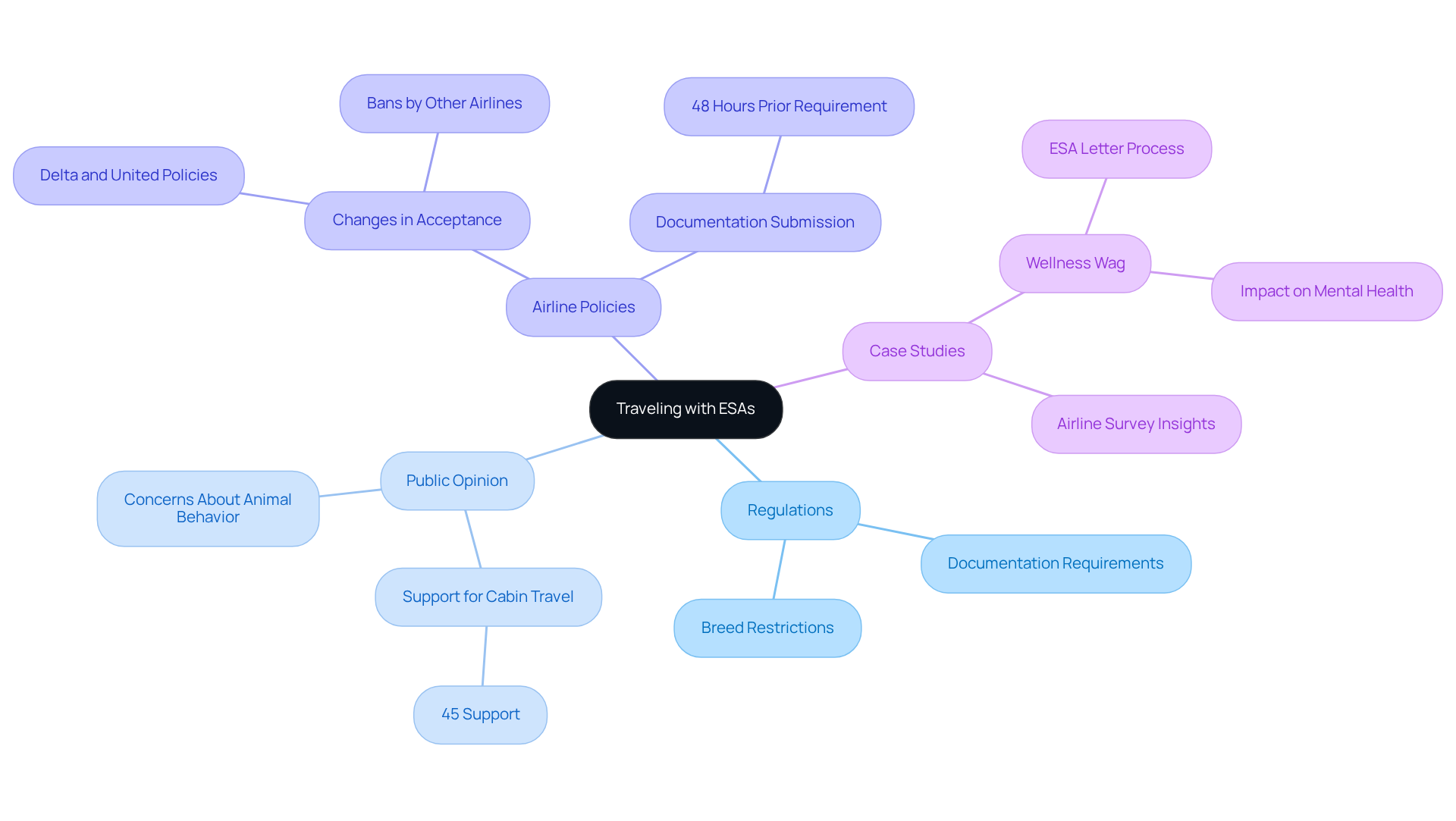
Debunking Myths: What You Should Know About Emotional Support Animals
Many myths about pet support animals continue to persist, and it’s important to clarify these misunderstandings. For those struggling with mental health issues, the idea that pet support animals require specialized training can be particularly distressing. However, it’s essential to understand that these animals do not need to perform specific tasks like service animals do. In fact, most emotional support animals, which can also be referred to as pet support animals, are simply beloved pets before they receive their ESA letters, and there are no legal training requirements for them.
Another common misconception is that emotional support animals have the same access rights as service animals, which is not true. While service animals are granted public access under the Americans with Disabilities Act (ADA), allowing them to accompany their handlers in various public spaces such as restaurants and stores, pet support animals primarily have housing rights under the Fair Housing Act. This legislation enables them to reside in pet-restricted accommodations, provided they have the necessary documentation.
Understanding these distinctions is crucial for ESA owners and the general public regarding pet support animals. Recent research indicates that only about 30% of people accurately grasp the differences between service animals and emotional support animals. This highlights the need for ongoing education and awareness. Case studies have shown that clarifying these misconceptions can greatly enhance the experiences of pet support animal owners, empowering them to advocate for their rights more effectively.
Additionally, while there is no legal requirement for service dogs to be certified or registered, obtaining certification can lend credibility and ensure that the service dog has received proper training. This is beneficial for both the owner and the public, fostering a sense of trust and safety.
The potential for fraud related to ESA registrations presents challenges for legitimate ESA owners, making the importance of certification for service dogs even more critical. By dispelling these myths and addressing these concerns, we can work together to create a more informed community that recognizes the vital role emotional support animals, including pet support animals, and service dogs play in enhancing mental health. Remember, you are not alone in this journey, and support is available to help you navigate these challenges.
The Importance of Pet Insurance for Support Animal Owners
Pet insurance holds significant value for owners of pet support animals, including emotional assistance companions (ESA), providing a crucial safety net against unexpected veterinary expenses. As the costs of pet care continue to escalate—averaging around $1,391 annually for dogs and $1,149 for cats—having insurance can bring immense peace of mind. It ensures that owners can afford necessary treatments without the added stress of financial strain. In fact, nearly 40% of pet owners have insurance to help manage these costs, which reflects a growing awareness of its importance in the pet ownership landscape.
Moreover, many pet insurance plans offer coverage for behavioral therapy, which is particularly beneficial for pet support animals that may require additional support. This aspect is vital, as emotional assistance animals often play a significant role in their guardians’ mental well-being, making it essential to safeguard their health.
Real-life stories illustrate the financial challenges faced by ESA owners lacking insurance. Consider the case of Rocky, an 8-year-old dog diagnosed with lymphoma, whose hospital bill exceeded $6,300. Thanks to his MetLife Pet insurance policy, his owners were reimbursed approximately $5,000, easing some of the financial burden and allowing them to concentrate on Rocky’s care.
As we look ahead to 2025, the importance of pet insurance for owners of pet support animals cannot be overstated. The pet insurance market is anticipated to grow from $8.6 billion in 2022 to an estimated $16 billion by 2032, highlighting the increasing relevance of pet insurance. It not only helps cover routine veterinary costs but also provides financial support during emergencies, making it an essential consideration for anyone relying on the companionship of a pet support animal.
Emotional and Psychological Support: The Role of Pet Companionship
The companionship of a pet support animal plays a crucial role in enhancing emotional and psychological wellness. Pets provide unconditional love, which significantly alleviates feelings of loneliness and encourages social interaction. Research has shown that pet ownership can lead to a 31.8-minute increase in weekly mild-intensity physical activity, a factor closely linked to improved emotional health. During the COVID-19 pandemic, pet owners reported feeling less lonely compared to non-pet owners, illustrating the comforting presence of pets during stressful times.
Psychologists highlight that the presence of pets can assist individuals in managing stress and anxiety, making them invaluable companions for those grappling with mental health challenges. A survey found that:
- 85% of respondents believe that interactions with pets can help reduce loneliness.
- 80% of pet owners report feeling less lonely due to their pets.
This underscores the profound impact pets have on emotional support and social connections.
Real-life experiences further illustrate this bond; individuals with pet support animals frequently report enhanced feelings of security and comfort, which can alleviate symptoms of anxiety and depression. The significance of pet companionship in mental health is increasingly acknowledged, with experts advocating for the incorporation of pet support animals into therapeutic practices to bolster psychological well-being. As we move through 2025, the importance of emotional assistance creatures in promoting mental wellness continues to gain attention, highlighting the need for accessible resources such as ESA letters to support individuals in need.
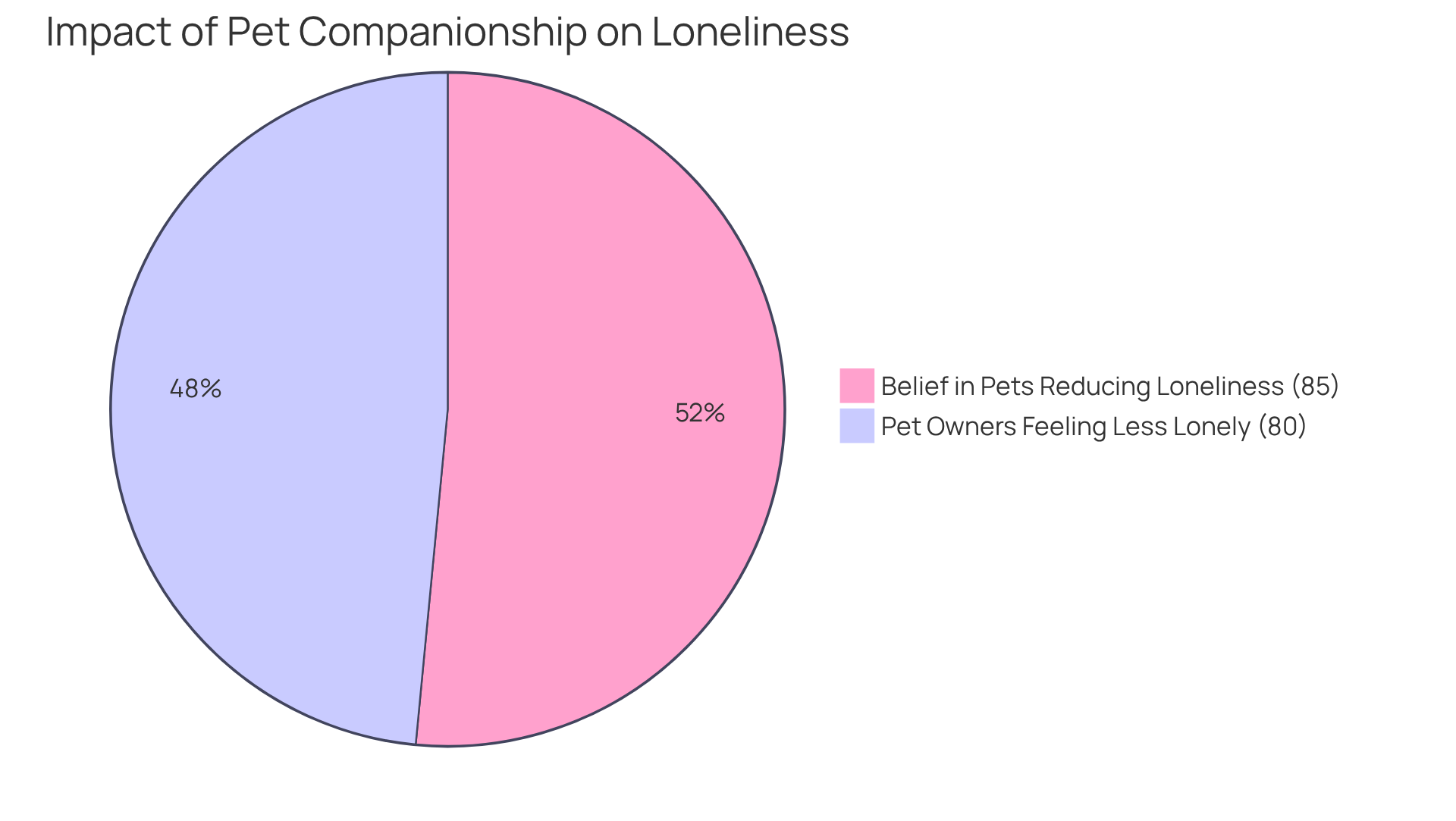
Additional Resources: Where to Learn More About Pet Support Animals
For individuals striving to enhance their understanding of pet support animals, a wealth of trustworthy resources is available. Organizations such as the American Psychological Association and the National Alliance on Mental Illness provide extensive insights into the benefits, rights, and responsibilities associated with emotional support animals.
At Wellness Wag, we are dedicated to empowering individuals through accessible Emotional Support Animal Letters, ensuring that everyone can experience the transformative companionship these animals offer. The Emotional Support Animal Registry serves as a valuable platform, guiding individuals on how to obtain ESA letters and the legal protections afforded to ESA owners.
Consulting licensed mental health professionals can provide personalized guidance tailored to individual circumstances, ensuring that individuals receive the most relevant support.
Have you ever felt the weight of emotional challenges? Statistics reveal that:
- 32% of pet owners have their pets certified as ESAs, indicating a growing acknowledgment of their mental health benefits.
- 62% of ESA owners reported improved mental health during the COVID-19 pandemic, underscoring the vital role these creatures play in emotional well-being.
It is also crucial to understand the distinctions between emotional support animals and service dogs, especially concerning legal rights and access under the Americans with Disabilities Act (ADA). As awareness of ESAs continues to grow, accessing these resources can empower individuals to advocate for their rights and enhance their mental health journey.
Additionally, it’s important to recognize that eligibility requirements for obtaining an ESA letter include:
- Being of legal age
- Having the legal capacity to enter into contracts
- Complying with local laws
By understanding these requirements, individuals can more effectively navigate the process of obtaining their ESA letters.
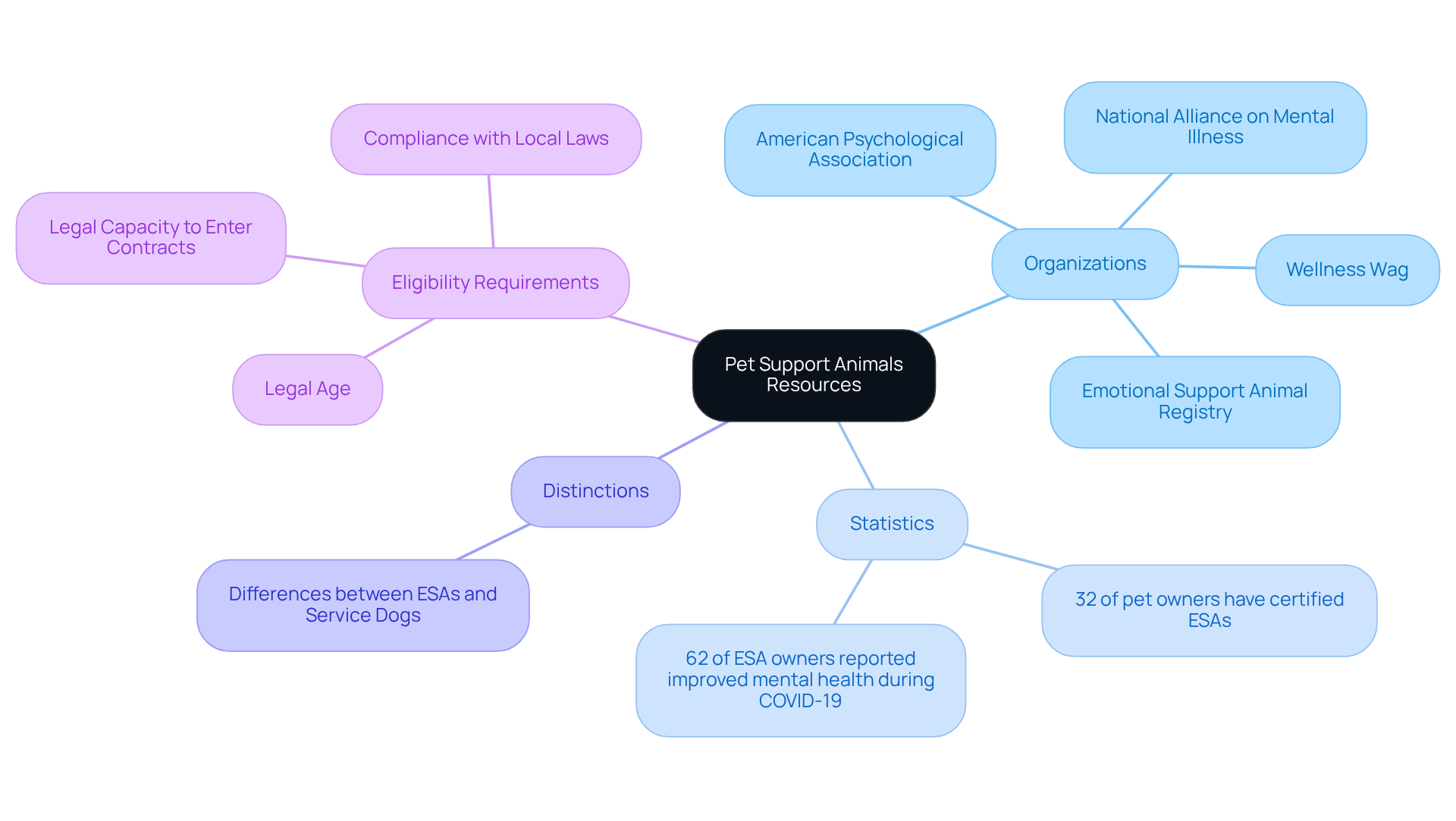
Conclusion
The significance of emotional support animals (ESAs) in enhancing mental health and overall well-being is profound. These beloved companions offer invaluable emotional support, assisting individuals as they navigate the complexities of mental health challenges. The insights shared in this article reveal that pet support animals not only alleviate feelings of loneliness and anxiety but also play a vital role in improving the quality of life for many.
Many individuals face emotional challenges that can feel overwhelming. The companionship of an ESA provides not just comfort but also a sense of belonging, reminding us that we are not alone in our struggles. The article discusses:
- The legal distinctions between service animals and emotional support animals.
- The therapeutic benefits of companionship.
- The essential steps for obtaining an ESA letter as a supportive solution.
Moreover, understanding housing rights and navigating travel regulations with ESAs is crucial, emphasizing the need for clarity and advocacy in these areas. The growing recognition of the value of pet insurance for ESA owners highlights the financial considerations that come with responsible pet ownership, further supporting the journey toward emotional stability.
As our understanding of mental health continues to evolve, so does the recognition of the essential role that emotional support animals play in our lives. It is important to advocate for awareness, education, and legal protections surrounding ESAs. For those seeking companionship and emotional stability, exploring the available resources and support systems can significantly enhance their journey toward improved mental health. Embracing the benefits of emotional support animals can lead to a more fulfilling and balanced life, reminding us that we are never truly alone in our struggles.
Frequently Asked Questions
What services does Wellness Wag provide for pet owners?
Wellness Wag offers streamlined services to obtain Emotional Support Animal (ESA) letters, ensuring quick and easy access to support for individuals facing mental health challenges.
How does the ESA registration process work at Wellness Wag?
The registration process begins with a brief assessment to determine eligibility, followed by consultations with licensed medical professionals to evaluate individual needs. Once approved, an official ESA letter is typically received within 24 hours.
Are there any specific timelines for receiving ESA letters in certain states?
For states with specific regulations, it may take up to 30 days to receive the ESA letter as required by law.
What impact do Emotional Support Animals have on mental health?
Research shows that 62% of ESA owners reported improved mental health during the pandemic, highlighting the positive effects of ESA companionship on emotional well-being.
What distinguishes service animals from emotional support animals?
Service animals are specifically trained to perform tasks related to a person’s disability and have broader access rights in public spaces, while emotional support animals provide comfort and companionship but do not have the same public access privileges.
What legal protections do service animals and emotional support animals have?
Service dogs have full public access rights under the Americans with Disabilities Act (ADA) and are allowed in public spaces, while emotional support animals are primarily protected by housing regulations, allowing them to live in no-pet accommodations.
What are the therapeutic benefits of emotional support animals?
Emotional support animals can alleviate symptoms of anxiety, depression, and PTSD, leading to reduced stress levels and enhanced mood. Studies indicate that interactions with pets can stimulate the release of happiness-related hormones.
What statistics support the effectiveness of emotional support animals?
A study found that 88% of ESA owners reported a positive impact on their mental health, with many rating the effectiveness at 8/10 or higher. Additionally, 69% of pet owners cite companionship as a key benefit, and 66% believe their pets help relieve stress.
How do emotional support animals contribute to socialization and belonging?
The companionship of emotional support animals can mitigate feelings of loneliness and promote a sense of belonging, making them valuable allies in improving mental health.
Certify Your Emotional Support Animal Today

Why You Can Rely on Us?
At Wellness Wag, we believe your pet deserves care rooted in both science and compassion. Each article is carefully researched, written in clear language for pet owners, and then reviewed by qualified professionals to ensure the information is evidence-based, current, and practical for real-life care. Our goal is to help you feel confident in making informed decisions about your pet’s health and well-being.
Reviewed by
Angela Morris, MSW, LCSW
Angela is a licensed clinical social worker with 20 years of experience in patient advocacy and community mental health. She has assisted numerous clients with ESA evaluations and brings a deep understanding of disability accommodations, ensuring that all information is accurate, supportive, and practical.

Written by :
Lena Park
Last Updated :
July 6, 2025












